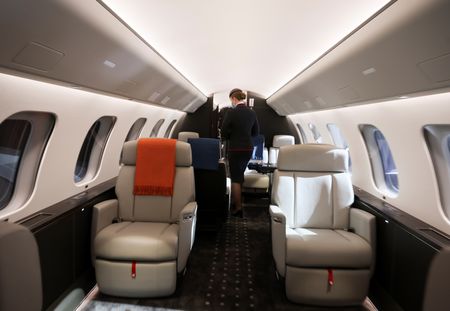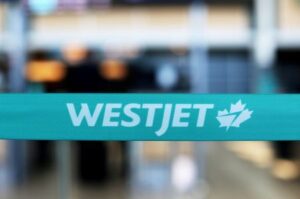By Allison Lampert, David Ljunggren and Tim Hepher
MONTREAL/OTTAWA (Reuters) -Bombardier on Thursday became the latest planemaker to disclose an exemption from Canadian sanctions on Russian titanium, as Canada defended its decision to grant a partial reprieve from recent measures imposed over the war in Ukraine.
On Tuesday, Reuters first reported that Airbus had won a waiver from a new Canadian ban on Russian titanium, weeks after Ottawa added supplier VSMPO-AVISMA to a list of entities banned for alleged ties to Russia’s military-industrial complex.
Canada is the first Western government to ban Russian supplies of the strategic metal as part of a package to mark the second anniversary of Russia’s Ukraine invasion in February.
VSMPO has for years been a critical supplier of titanium, which is prized for its strength relative to its weight.
Traditional customers included most Western planemakers including Bombardier at a time when it was developing the CSeries passenger jet, which it sold to Airbus in 2018.
Now purely a manufacturer of business jets, Bombardier no longer purchases Russian titanium directly. But some of its suppliers do, so the company needed an exemption, CEO Eric Martel said during a quarterly results presentation.
“We did work with the government and we did work also with all our supplier base to make sure we were doing the right thing. But at the same time we needed to ensure you know that we keep running our factories,” he told reporters.
Canada’s decision to row back on part of the ban for a limited period has been criticized by Ukraine’s ambassador to Canada, who on Wednesday called the Airbus waiver “disturbing”.
Yulia Kovaliv also told national broadcaster CBC that she had sought an explanation from the Canadian government.
The Ukrainian Canadian Congress on Wednesday urged the government of Justin Trudeau to enforce its sanctions policy.
Speaking to reporters on Thursday, Foreign Affairs Minister Melanie Joly defended the waiver decisions and said jobs in Canada had been the decisive factor.
“We will always make sure to put maximum pressure on the Russian regime and meanwhile protect our jobs here at home. We can do that together,” she said.
Two sources familiar with the matter said Canada’s decision to impose sanctions took other Western aerospace nations by surprise and provoked behind-the-scenes discussions between Ottawa and various capitals.
‘DECREASED EXPOSURE’
Canada’s foreign ministry says it has made clear to companies that they must find other sources of titanium.
Exemptions issued so far apply only to the aerospace sector, including the military, said a Canadian source with direct knowledge of the matter.
The exemption is available only for a limited time, said the source, who requested anonymity given the matter’s sensitivity.
Airbus has repeatedly argued that banning Russian titanium would damage the aerospace industry while barely hurting Moscow.
In Europe, CEO Guillaume Faury said Airbus and others had secured Canadian approvals “to continue to source the small quantity of titanium that we still need.”
“The Western industry has very significantly decreased its exposure but there is still a certain flow of titanium that is coming and that enables a very large industry,” Faury told reporters.
“The other main countries of Western aviation have taken a different route which fits with our needs and our beliefs and we expect and we hope to continue to be understood,” he added.
Asked if he was concerned about the apparent breach in Western unity over titanium sanctions policy, Faury said: “I don’t see it as a rupture of unity … but more as a way for the Canadians to deal with the situation.”
The titanium row overshadowed a strong set of orders that pushed shares in Bombardier up 9% on Thursday.
Orders for its jets rose 60% in the first quarter, pushing the company’s backlog to $14.9 billion.
But like others in the supply-stretched industry, Bombardier burned more cash than expected after boosting inventory to support increased production.
“While we continue to require more working capital investment in the near term, we will be well-placed in the second half of the year and well beyond,” Martel told analysts.
The company is ramping up production this year of its super mid-sized Challenger jets which seat about 10 and will expand manufacturing of its large-cabin Global aircraft in 2024.
It is facing a challenge from rival General Dynamics’ Gulfstream, which is starting deliveries of its flagship G700 luxury jet that was certified last month.
Bombardier reported 20 deliveries in the first quarter, down from 22 a year earlier but said it remains on track to hand over 150-155 jets this year. Revenue fell 12% due to a delivery mix favoring Challengers which are priced below the Globals.
(Reporting by Allison Lampert in Montreal, David Ljunggren in Ottawa, Tim Hepher in Paris and Abhijith Ganapavaram and Aatreyee Dasgupta in Bengaluru; Editing by Shounak Dasgupta, Franklin Paul, Matthew Lewis and David Gregorio)





